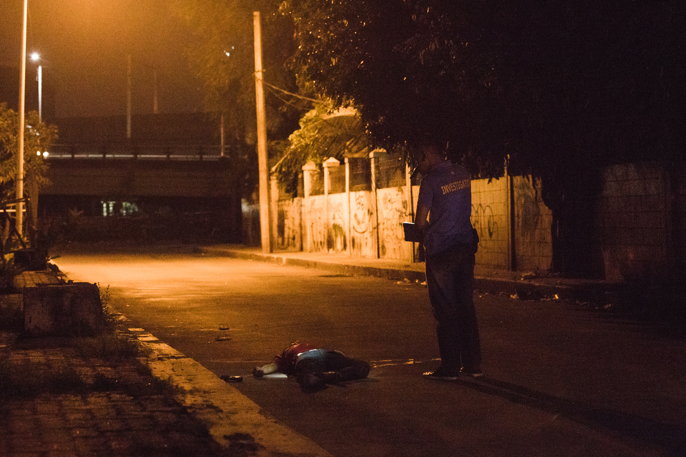
Karla (whose name has been changed to protect her identity) was sleeping on the second floor of her makeshift home when a man wearing a motorcycle helmet stormed into her living room. Her partner was sleeping beside his son Ben (not his real name) when he was shot by the assailant. Fifteen-year-old Ben, pretending to be asleep with his eyes half-open, saw his father bleed to death as the attacker in the white jacket fled.
“He [the killer] didn’t say anything,” recounted Ben. “He just suddenly fired his gun and we couldn’t do anything.”
Ben’s father, who was killed in July 2017, used to be a drug user, but his family claims he became clean shortly after Philippine President Rodrigo Duterte took office in late June 2016.
Their family is just one among thousands who violently lost their loved ones to the drug war in the Philippines that has claimed 3,969 “drug personalities” from July 1, 2016, to December 27, 2017, according to government sources. Non-governmental organizations and human rights advocates have a different estimate: According to Human Rights Watch, more than 12,000 Filipinos, mostly from low-income communities, have perished in drug-related police operations and murders by unidentified assailants.
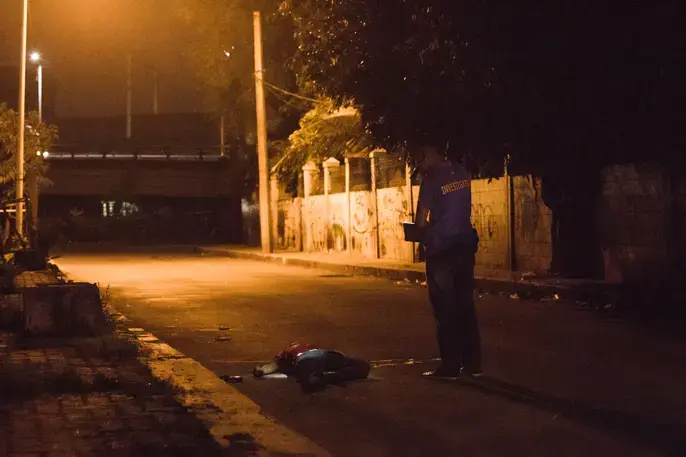
The drug war has claimed thousands of lives, but its casualties aren’t only the dead. For surviving families, especially those who witnessed the brutal murders of their relatives, the aftermath takes an intense emotional toll. And because there are multiple barriers to accessing mental health resources in the country, many find themselves alone in the aftermath.
“My world got smaller,” said Karla two weeks after her partner’s murder. In fear of their lives, Karla and her children moved houses after their neighbors saw unidentified men looking for them in their old home. “I got traumatized because I can feel my fear… My heart pounds even if I walk it off. Sometimes, I feel myself shaking when I walk, but I just try to be brave.”
For her son Ben, the bloody night he witnessed led to many sleepless nights.
“When I lie down at night, my chest tightens,” he said. Worried that his father’s murderer would come back for them, he keeps guard until the sun rises. “I am afraid of sleeping.”
Psychological toll
This is not uncommon. Many surviving relatives of the drug war have post-traumatic stress disorder, depression and anxiety, according to Maria Cruz (not her real name), who counsels families of those who were killed in the drug war. Cruz, who requested anonymity due to security reasons, is a volunteer psychologist at Rise Up for Life and for Rights, one of the few organizations that visit communities heavily affected by the drug war and provide community-based psychosocial services to relatives who were left behind. According to her, withdrawal symptoms, suicidal ideation, and paranoia among family members she counseled are not rare. She added that the grieving process is more difficult for these families because the circumstances surrounding the death aren’t normal.
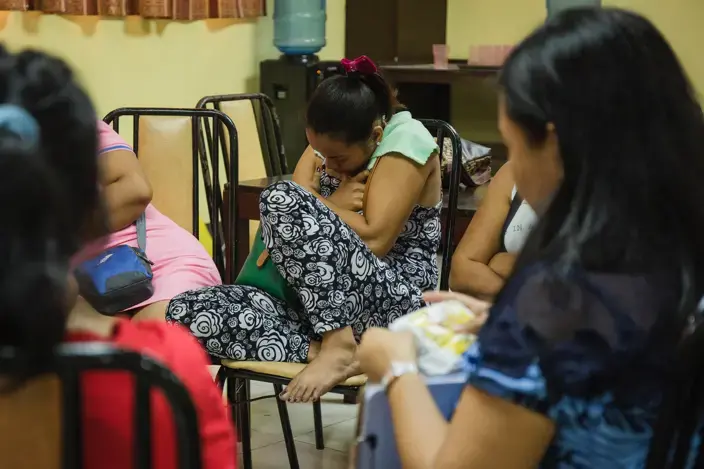
People react to violence in different ways, but there are common factors that compound the trauma that surviving families are already experiencing, according to Cruz. Intense fear has led many of them to leave their homes and go into hiding. Moreover, the wide support for the drug war and the stigma that comes with being a relative of a former drug user worsen families’ grieving process. “Instead of compassion, they are often not pitied. Instead, they are shunned,” said Cruz. “It's as if when you kill the users, the problem has been uprooted… This adds to the trauma of the family.”
Cruz and other psychologists at Rise Up for Life and for Rights stress the importance of community-based psychosocial therapy for surviving relatives of drug war victims who exhibit symptoms of trauma. If ignored, it may lead to more severe psychological conditions and unhealthy coping mechanisms like alcoholism and drug use, said Cruz.
“The [challenge] there is how to restore their lives back to normalcy. Actually, for many of them, they say the damage is irreparable, their families have already been torn apart,” said Cruz.
But the availability and accessibility of mental health resources for these people are far from sufficient.
Government response
After record-breaking drug crackdowns in August 2017 that killed 32 suspected drug personalities in one night, President Duterte said, “Let’s kill another 32 every day. Maybe we can reduce what ails this country.”
But as Rise Up for Life and for Rights organizers and psychologists have seen, that is far from true. “You eliminate them [drug personalities] and not only then are you impacting them but their children and their family,” said Rebecca Lawson, an organizer at Rise Up for Life and for Rights. “You're causing so much more trauma in the whole community and in the families… How can this possibly lead us to a better situation?”
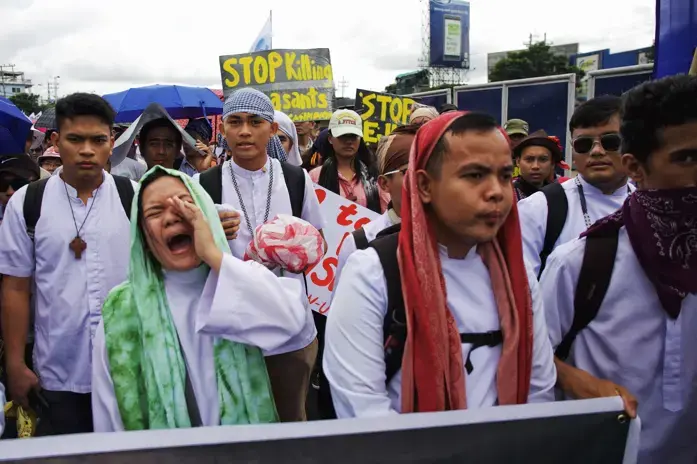
Despite the growing number of people who have been traumatized by the drug war, mental health resources remain sparse and inaccessible to many. According to the Department of Health, as of December 2016, there are 60 licensed psychiatric healthcare facilities in the country and one tertiary hospital. Only two of those are government-owned. Mental health facilities are also concentrated in cities.
The price of treatment is steep in private hospitals, and not all have free services or conduct outreaches. Government-owned hospitals provide free counselling to patients from lower income brackets.
But lack of mental health awareness, financial limitations, stigma and shortage of facilities make the institution-based system problematic. Filipinos often won’t immediately seek help from a mental health professional for a variety of reasons, according to Cruz; mental illness is stigmatized and many aren’t aware of the mental health resources available to them. This was the case for Karla who said she didn’t know that she could seek professional help, so she just kept working to distract herself.
Moreover, treatment is perceived to be expensive. And for many surviving drug war families, the cost of commuting to a mental health care facility is too steep for those who already struggle to put food on the table, said Cruz.
“Ideally, similar to any other health services, it [mental health services] should be brought to the community, instead of waiting for people to go to the hospital,” she said.
Lael Gasco, a social welfare officer at the Department of Social Welfare and Development, said that they have social workers who visit families affected by the drug war. According to her, social workers visit communities and assess their economic and psychological needs. However, many relatives that this reporter spoke to, including Karla, said they did not receive psychological support from the government. According to psychologists and activists at Rise Up for Life and for Rights, the government does not have a psychosocial program for those families. Families who have asked for help reported being passed from one government agency to another and receiving no mental health-related support, although some were given money by the government to help pay for burial costs.
“There is no clear [program],” said Selena Corpuz (not her real name), another volunteer psychologist at Rise Up for Life and for Rights who, in fear of retaliation, requested anonymity. "I think we need to look at the structure and ask if there really is a focus on giving counselling to make sure that these people are well taken care of in terms of their psychological needs.”
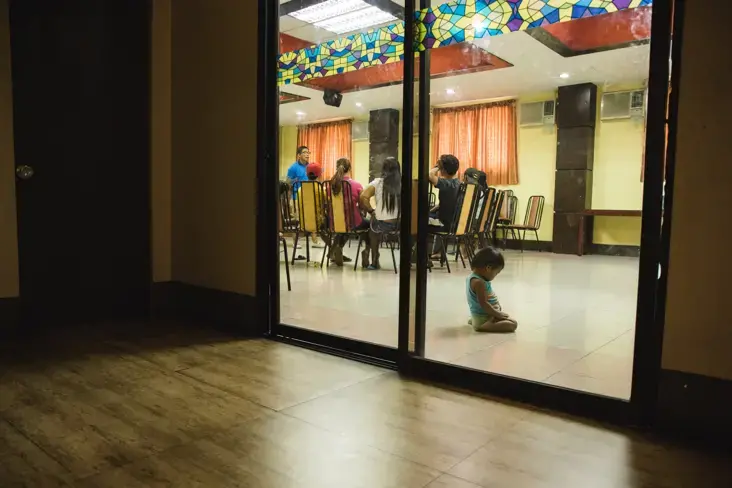
The drug war continues to take a hold on the lives of those who were left behind. But to many of them, mental health resources are secondary to what they really hope for. “[The government] should give the families of those they killed a shot at a new life,” said Karla, who is still in hiding with her children and continues to live in fear. “And I hope they won’t kill people who have changed for the better. They shouldn’t think that addicts cannot change.”










